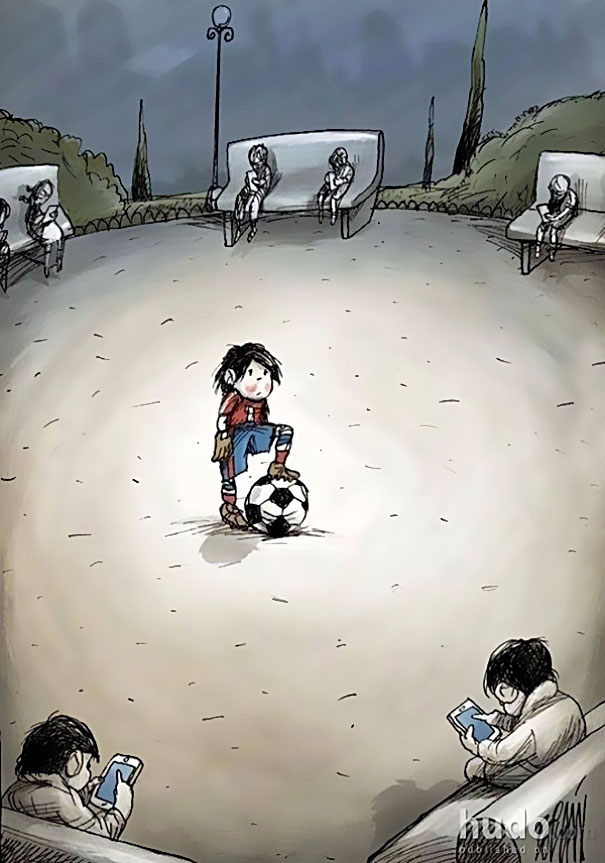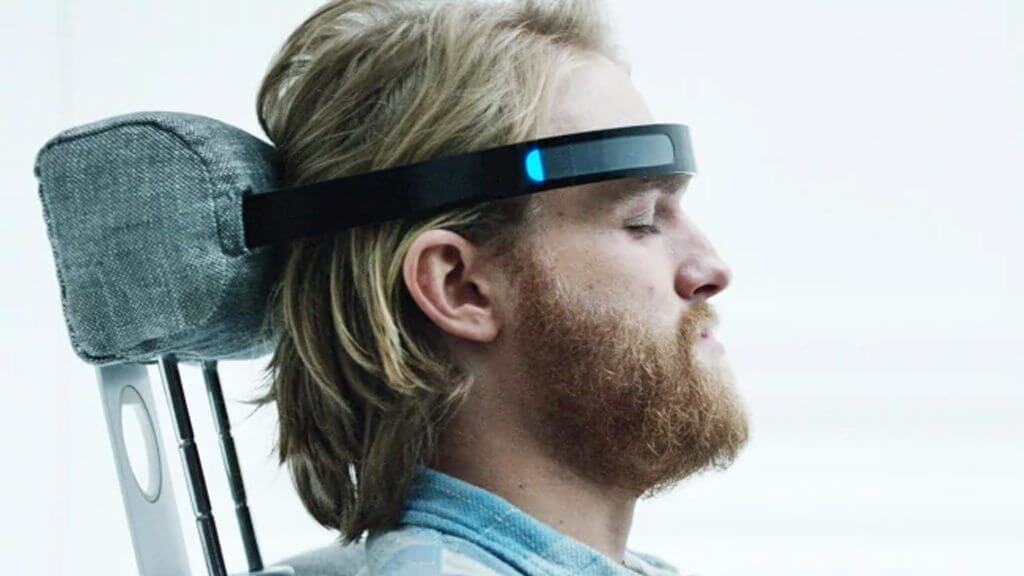In the art work by Angel Boligan, the artist centers the piece around a seemingly lonely individual that is dressed for soccer. Although the individual seems properly prepared for an exciting day at the park, the individual is the most out of place. The people surrounding the main subject are all on their smartphone device. This highlights how the internet is slowly taking away life’s simplest joys, such as playing soccer at a park. Too often, people are attached to their smartphones for its easy accessibility to the internet. Evidently, in the modern age, people are much more susceptible in missing out on their current experience since they are too busy on their phones. The use of color in Boligan’s piece is also interesting. For one, the only outfit that has color is the soccer player, as this player is the only one not on their phone, this may symbolize society’s last hope in embracing life’s beauties [I’m trying to say something along the lines of how this player represents what kids are supposed to do instead of staying attached to technology]. Furthermore, the background has color, but not bright or sunny like a day in a park should be. The colors are dulled down: the sky is dark blue rather than the standard sky-blue and the grass and trees are more gray than green. This can symbolize the decreasing appreciation of nature. When the soccer player entered the park, the player experienced nature’s true beauty: a bright blue sky and healthy green trees. However, as the individual’s intentions were to escape from a world of technology, the people on the park benches with their faces glued to their smartphones, presents the depressing reality in how the internet is ruining the world. After coming to that realization, the individual’s perception of life is dulled down; nature is no longer bright skies and green grass. [I’m trying to talk about how the soccer player came in bright and full of energy, but after realizing everyone on their smartphones, the soccer player changes. The individual no longer cares much for nature, which is reflected by the dull colors in the background. The individual’s mindset is altered to the one’s sitting at the park benches.] At some point, the kids on the bench were in the same situation this soccer player is currently in. This directly addresses the current zeitgeist as parks have become less and less populated. Many millennials would avoid parks, especially in New York City, to seek better forms of entertainment. This includes attending movies, eating at a restaurant and documenting it on social media, or simply staying home to play video games or to access Hulu or Netflix. On one hand, the internet has connected people across the world, but on another hand, the internet has disconnected many from real experiences. [I’m trying to suggest that the internet has disconnected people from the outside world and how there are many so obsessed with the internet that they find it hard to communicate with people or friends in person.]
In the Black Mirror episode, Cooper Redfield is travelling the world after his father’s death and eventually ends up Britain where he doesn’t have any money left. Cooper seeks to playtest a new game since he needs the money to get back home. The game turns out to be highly innovative and experimental as it augments reality. The game claims to be adaptive and tailored to the fears of the individual playing. After playtesting, Cooper books a plane home to see his mother, but it turns out he never really left the game. He then dies due to his phone ringing. [I wanted to include a brief summary but didn’t know how to pull out important parts without trying to give short explanations for everything.] Although on the surface, this episode was about a guy playtesting a horror game and then later dying, there seems to be an underlying metaphor. In the beginning of the episode, the audience knows his father passes because of Alzheimer, which prompts Cooper to travel the world. Throughout the episode, his mother constantly calls Cooper, but he consistently rejects or ignores her calls. In a sense, Cooper travelling could symbolize him browsing the internet in ways to cope with hardship, in this case: his father’s death. And at Cooper’s last stop in Britain, he was ready to go home and talk to his mother, but he passes away. This addresses the current social zeitgeist as all millennials go through some sort of hardship, but most of them look through the internet on ways to get better or how to solve their dilemma. However, a simple face to face conversation with a family member, friend, or professional can make going through these hardships easier. Currently, many people are hesitant to talk face to face, and with the internet, millennials are continuing to believe they’re experts and require no additional assistance. [I feel like this metaphor may be far-fetched, but I wanted to hear some feedback first.] [I’m trying to suggest that talking about hardships is much better and much more therapeutic than simply searching for answers on the internet. And I’m trying to point out that having conversations are more genuine than having them over the internet/phone.]
Another take on this episode of Black Mirror is how much people have trusted the internet. As Cooper gathers his valuables to travel, he noticeably takes his phone, passport, and his luggage. Throughout his travel experience, he heavily relies on his smartphone for a source of income and companionship. He uses the Oddjobs app to apply to a job with a touch of a button and meets up with people through apps that look like Tinder. Cooper meets Sonja, who is seemingly nice and invites him to stay. Then through Oddjobs, Sonja points Cooper’s attention to the playtest, with that, Cooper is driven to the company’s headquarters, not before saying “Well, where is this place.” Cooper has put his full trust into a job where he seemingly knows nothing about, and into a person he just met a few days ago. Then, when Cooper playtests the game, Sonja appears in the game and attempts to kill him. [I’m trying to suggest that meeting strangers and trusting them so quickly could foster negative consequences.] This addresses the current social zeitgeist since there are many apps that require your trust. One instance is Uber, where at the touch of a button a car is at your doorstep to pick you up. Although Uber has made their service safer, people are putting their full trust into a stranger to safely drive them to a location. This in turn has created countless incidents where Uber consumers were sexually assaulted, killed, kidnapped, etc. Also, Tinder and Bumble are dating apps that match you with other strangers on the app. People are quick to put their trust in these apps, which was the result of countless incidents. Millennials want something fast and easy, and these apps have travelling and dating simpler. [I’m trying to suggest that millennials sacrifice their safety for more efficient ways of living.]




I like how you analyzed the color of the art piece for your first artifact. I agree on how people need to be exposed to other people and nature. For the second artifact, I like the symbolism of how traveling means Cooper seeking the internet to cope with his hardships.
I like your interpenetration of the Black Mirror episode. It is an interesting way to look into the episode that seems to be self explanatory.
Your artifacts correlate perfectly to your clim. I like your use of the cartoon as an artifact.